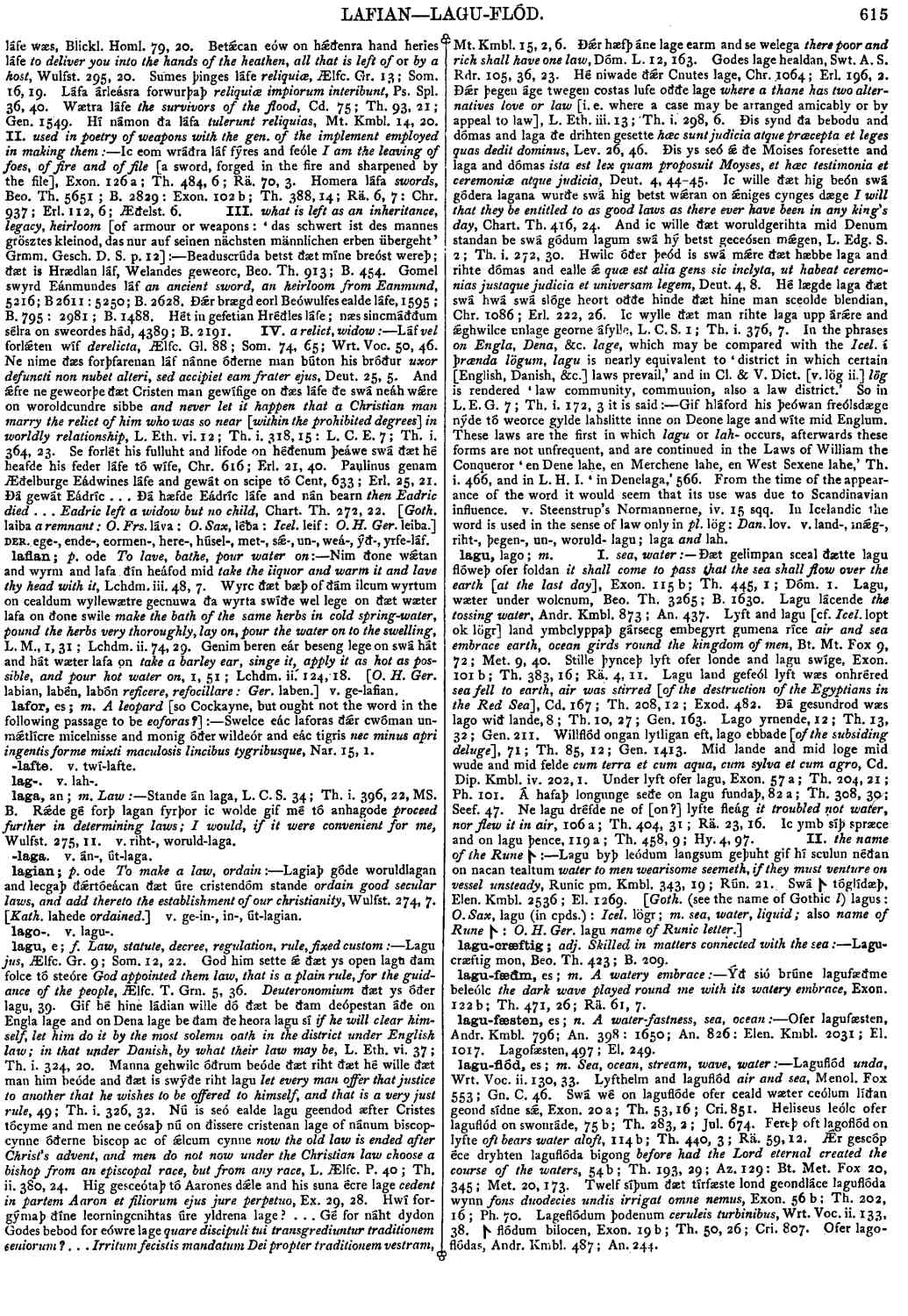lagu
- noun [ feminine ]
-
Lagu
jus,
- Ælfc. Gr. 9 ;
- Som. 12, 22 .
-
God him sette ǽ ðæt ys open lagu ðam folce tó steóre
God appointed them law, that is a plain rule, for the guidance of the people,
- Ælfc. T. Grn. 5, 36.
-
Deuteronomium ðæt ys óðer lagu,
- 39 .
-
Gif hé hine ládian wille dó ðæt be ðam deópestan áðe on Engla lage and on Dena lage be ðam ðe heora lagu sí
if he will clear himself, let him do it by the most solemn oath in the district under English law; in that under Danish, by what their law may be,
- L. Eth. vi. 37 ;
- Th. i. 324, 20 .
-
Manna gehwilc óðrum beóde ðæt riht ðæt hé wille ðæt man him beóde and ðæt is swýðe riht lagu
let every man offer that justice to another that he wishes to be offered to himself, and that is a very just rule,
- 49 ;
- Th. i. 326, 32 .
-
Nú is seó ealde lagu geendod offer Cristes tócyme and men ne ceósaþ nú on ðissere cristenan lage of nánum biscopcynne óðerne biscop ac of ǽlcum cynne
now the old law is ended after Christ's advent, and men do not now under the Christian law choose a bishop from an episcopal race, but from any race,
- L. Ælfc. P. 40 ;
- Th. ii. 380, 24 .
-
Hig gesceótaþ tó Aarones dǽle and his suna écre lage
cedent in partem Aaron et filiorum ejus jure perpetuo,
- Ex. 29, 28 .
-
Hwí forgýmaþ ðíne leorningcnihtas úre yldrena lage? ... Gé for náht dydon Godes bebod for eówre lage
quare discipuli tui transgrediuntur traditionem seniorum? ... Irritum fecistis mandatum Dei propter traditionem vestram,
- Mt. Kmbl. 15, 2, 6 .
-
Ðǽr hæfþ áne lage earm and se welega
there poor and rich shall have one law,
- Dóm. L. I2, 163 .
-
Godes lage healdan,
- Swt. A. S. Rdr. 105, 36, 23 .
-
Hé niwade ðǽr Cnutes lage,
- Chr. 1064 ;
- Erl. 196, 2 .
-
Ðǽr þegen áge twegen costas lufe oððe lage
where a thane has two alternatives love or law [i.e. where a case may be arranged amicably or by appeal to law],
- L. Eth. iii. 13 ;
- Th. i. 298, 6 .
-
Ðis synd ða bebodu and dómas and laga ðe drihten gesette
hæc sunt judicia atque præcepta et leges quas dedit dominus,
- Lev. 26, 46 .
-
Ðis ys seó ǽ ðe Moises foresette and laga and dómas
ista est lex quam proposuit Moyses, et hæc testimonia et ceremoniæ atque judicia,
- Deut. 4, 44-45 .
-
Ic wille ðæt hig beón swá gódera lagana wurðe swá hig betst wǽran on ǽniges cynges dæge
I will that they be entitled to as good laws as there ever have been in any king's day,
- Chart. Th. 416, 24 .
-
And ic wille ðæt woruldgerihta mid Denum standan be swá gódum lagum swá hý betst geceósen mǽgen,
- L. Edg. S. 2 ;
- Th. i. 272, 30 .
-
Hwilc óðer þeód is swá mǽre ðæt hæbbe laga and rihte dómas and ealle ǽ
quæ est alia gens sic inclyta, ut habeat ceremonias justaque judicia et universam legem,
- Deut. 4, 8 .
-
Hé lægde laga ðæt swá hwá swá slóge heort oððe hinde ðæt hine man sceolde blendian,
- Chr. 1086 ;
- Erl. 222, 26.
-
Ic wylle ðæt man rihte laga upp árǽre and ǽghwilce unlage georne áfylle,
- L. C. S. 1 ;
- Th. i. 376, 7 .
-
In the phrases
on Engla, Dena, etc. lage,
which may be compared with the Icel. í þrænda lögum, lagu is nearly equivalent to 'district in which certain [English, Danish, etc.] laws prevail,' and in Cl. V. Dict. [v. lög ii.] lög is rendered 'law community, communion, also a law district.' So in L. E. G. 7; Th. i. 172, 3 it is said :--Gif hláford his þeówan freólsdæge nýde tó weorce gylde lahslitte inne on Deone lage and wíte mid Englum.
These laws are the first in which lagu or lah- occurs, afterwards these forms are not unfrequent, and are continued in the Laws of William the Conqueror'en Dene lahe, en Merchene lahe, en West Sexene lahe,'
- Th. i. 466 , and in
- L. H. I. 'in Dendaga,'
- 566 .
Bosworth, Joseph. “lagu.” In An Anglo-Saxon Dictionary Online, edited by Thomas Northcote Toller, Christ Sean, and Ondřej Tichy. Prague: Faculty of Arts, Charles University, 2014. https://bosworthtoller.com/21043.
Checked: 1